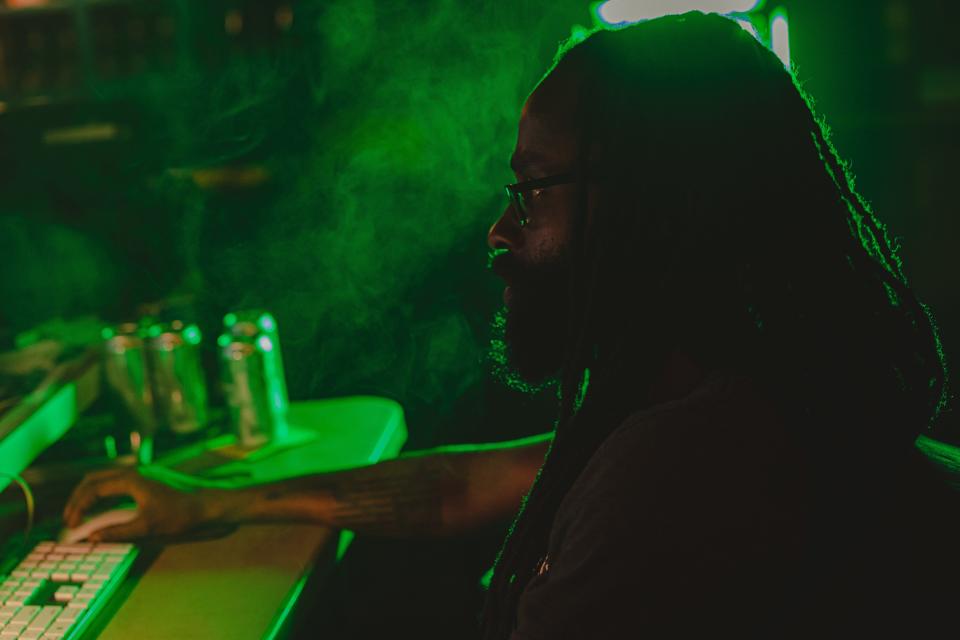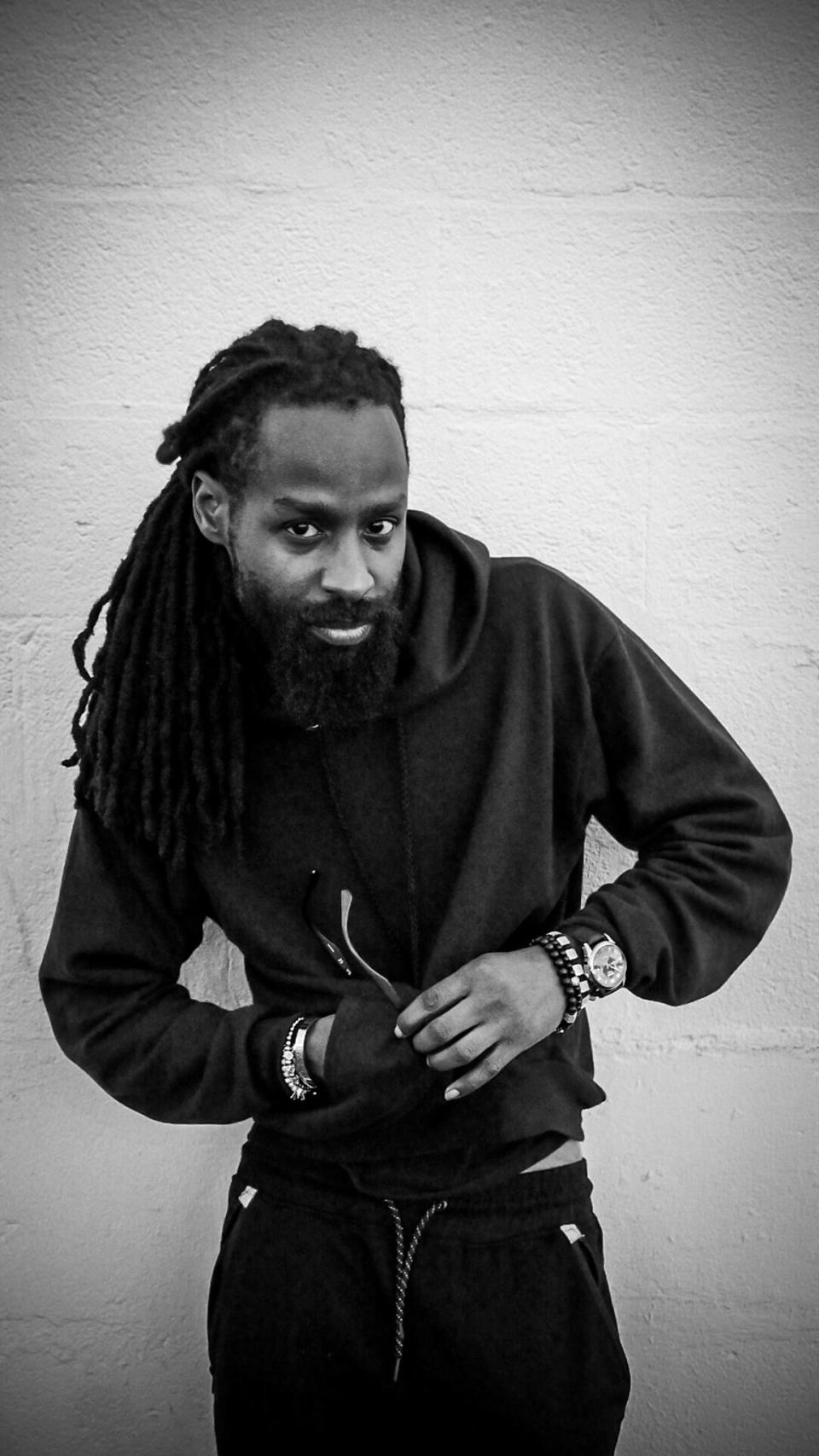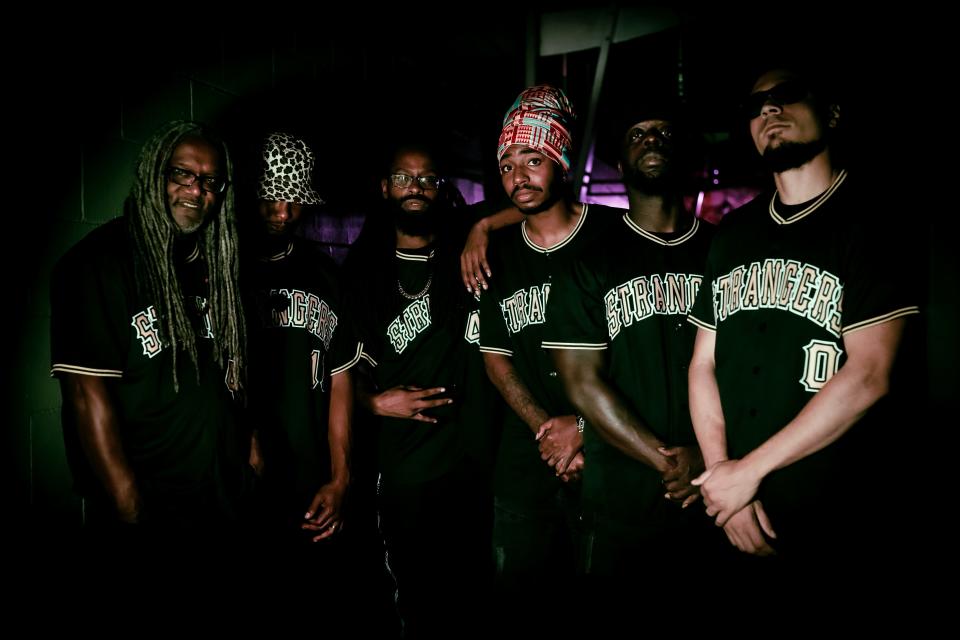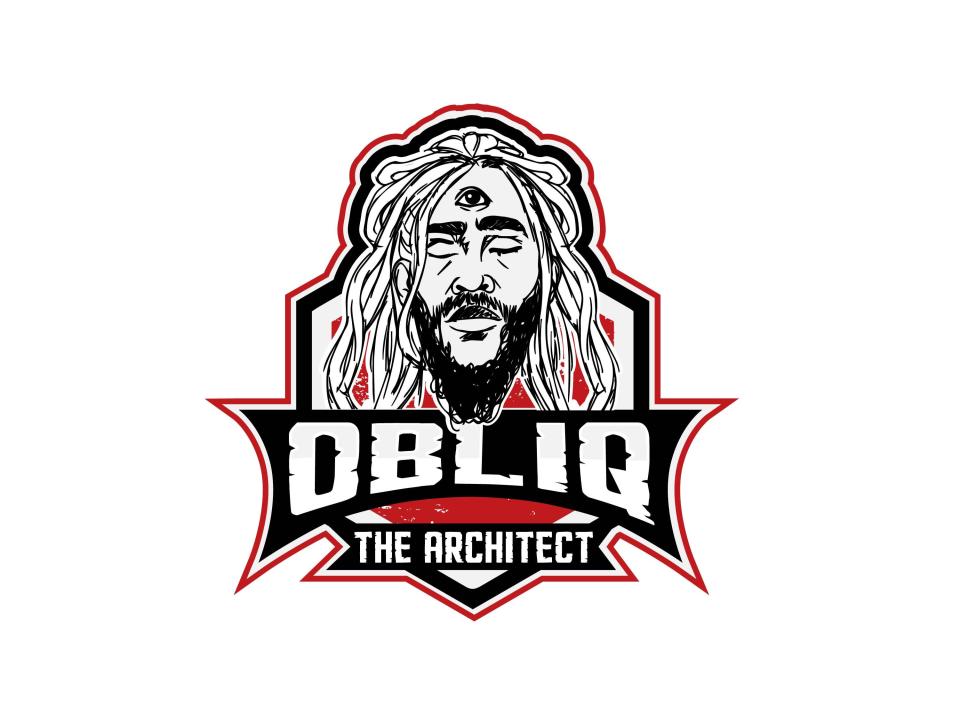FWB rapper Obliq, architect of the Elevated Underground, reflects on career
FORT WALTON BEACH — Plenty of musicians boast they hustle in private, suggesting they’re immune to the urge to share their work ethic with others.
Most are lying through their teeth.
But under a curtain of long dreadlocks in an ensemble as black as his morning coffee and tucked away, head down, in a lair of a recording studio so strategically placed in downtown Fort Walton Beach that you’d never know it was there, Marcus Leslie really does hustle in private.

Another local rapper: Renaissance man: From rap to stand-up comedy, FWB's Hollywood Mechee was born for the stage
More local music: Three Fort Walton Beach rappers 'guarantee' you will put their new single on repeat
With that Batman-esque description, you also might suspect the rapper and sound engineer better known as Obliq the Architect, is the least approachable dude ever. Wrong.
In fact, Obliq often finds himself almost excessively approachable, to the point where even minding his own business, someone might start up a conversation or ask to jog next to him (he’s a runner). And even though he is trapped in an introvert’s body, he will likely indulge it and even contribute; he’s especially down to talk music.
Yeah, Obliq is a bit of an enigma (and a Virgo), and that’s what sets him apart.
Like many sound engineers, he wants to work alone. But he’s also down to have company, and he not only hears, but also welcomes feedback.
He asks, “How are you?” And get this: He actually listens to your answer.
Artists Obliq has worked with include those on the Elevated Underground record label roster, as well as Rashawn Stallworth, Gitworld, Kuh-Lee-Uh, TDF Bando, Chrx Carter, P-Funk, Esraelia and many others in the 850 area code.

Wherever there is a local recording artist shining, behind them, in the shadows, is Obliq — not hiding, just hustling in private.
That’s how they do it in the Elevated Underground.
How Obliq's music career began
Obliq knows exactly how it started.
Boom. Boom.
Obliq heard a beat while playing basketball in the practice facility at Gould Academy in Bethel, Maine. It wasn’t the sound of the basketball dropping on the hardwood floor. it was the bass dropping in the multimedia studio above.
There, he found "Mr. Z," the music technology teacher.
Obliq was hooked instantly. He ended up winning the music technology award that year, only ironic because he was never enrolled in the class.
“I was in there more than the students were," Obliq said. "I was in there all the time making beats, and that's how I started rapping, because I didn't have anybody to rap on my beats."
Rapper Nelly was popping that year. His album, “Country Grammar,” had just come out, followed with 50 Cent’s “Get Rich or Die Tryin’.” Even soaking in the "golden era" of rap and his favorite band Earth, Wind & Fire, Obliq still thinks his own beats were trash. His work ethic wasn’t.

Obliq grew up around music.
His mother, Lynnetta Robinson, was a gospel singer and his two older cousins, Michael and Brandon Leslie, had a hip-hop group called OTC. Obliq memorized every word to every song.
“They were the dopest rappers ever to me,” he said.
Obliq was dying to earn studio time with Michael, the producer. He snagged some, but Michael not opening the door all the way is what forced Obliq to do it himself, he said.
His studio started in 2004 with a free laptop his college in Kentucky gave to scholarship students. Creativity was the name of the game.
“I formed a whole group and it was like eight of us and we're just sitting there rapping into the side of the hole on this laptop, the internal microphone hole. It's not as glorious as people think, the journey to where you're trying to get to. I feel like social media makes it seems like ‘Oh, it's just so easy. You're not gonna have to get it out the mud and it's not hard.’ When you really want it, you're gonna do whatever it takes."
When Obliq had his first daughter, he moved off campus as a non-traditional student and built a real studio, or at least his version.
“Everybody starts home studios, I feel like, the same way,” he said. “It’s usually in a closet or a bathroom, some foam on the walls or some egg cartons or whatever, which really does not work. But you don't find that out until later."
In college, Obliq produced only singles and albums.
“We used to have this thing, ‘We don't do mixtapes; we make albums,’ ” he said. “They sounded terrible. But we had fans, though."
He had haters, too. Obliq doesn’t think you can achieve anything in any field without thick skin. Even his mother was upset when he switched majors three times only to land on theater, administration and entertainment production.
“When you're trying to build something and you actually have a vision for it, you have to understand, it's your vision. No one else is going to see it because it's not their vision. But what happens is, if you believe in your vision, actually believe it and do what it takes, eventually things manifest, things come to fruition. ... When they see that you actually made it happen, they're extremely proud.
"My mom's extremely proud of me because I didn't listen to her.”
'The living soundtrack'
Rapping is one of Obliq’s favorite things in life. Much of his music is about his perspective and philosophy on life.
“(For) most young, especially black, men, rap is pretty much the same. We always rap about the same thing. In the beginning, it’s always just trying to sound good, to sound cool, 'What have I heard other people say? Let me try to say it better.' Then you get to that place where you just want to tell your story."
He has a saying: “Music is not my purpose; it’s my passion.” You hear his purpose through his passion, he explained.
“I believe one of my biggest purposes in life is to inspire people to be their true selves, by me being my truest self,” Obliq said. “I talk about things on tracks like financial literacy and not feeling the need to follow other people. There's a lot of just leadership s*** in my music, and it's still urban. I'm still speaking the language of the people I'm trying to connect with, but it's not glorifying violence. It’s not degrading to women.”
Obliq said he and his friends in Kentucky started "popping" in the area. He even gave Facebook a whirl, starting his first account in 2008 to connect people with him and his music.
“Every year, the sound was just progressively getting better. I don’t believe you improve unless you want to improve.”
'Fort Walton (Beach) adopted me'
Obliq and Price the Mic moved to Florida in 2012 with Obliq’s children and ex-wife. He has three children: Brooklyn, 16, Kamili, 13, and Tanea, 7.
Obliq came with empty pockets, sleeping on the beach for a few days before finding a place, said Demetrius Robinson (aka Hollywood Mechee), his close friend, artist and partner.
"He always tells me, 'Fort Walton (Beach) adopted me,' " Mechee said. "I think that's deep for him because of being kicked out and having to live with his grandparents when he was younger. That adopted thing is symbolic. That's a humble beginning, to come somewhere where you know nobody and to build what he's built, you can't do that if you're not a genuine person."
Obliq and Price went by the name Strange Tang. Strange meant different and tang meant swag, so it equated to "different flavor," he said. They loved infusing other genres into hip-hop, such as bluegrass, pop and reggae.
“The sound that we brought down here, people hadn’t heard it,” Obliq said.
The first thing they did was press a CD compilation of what they felt like were their best songs from the last three albums.
“We pressed up thousands of them, and we were just giving them away, really just giving them away every day,” Obliq said. “We did that for a solid year or so. Because we were just that guerilla about it — not aggressive about it — the name spread really fast. Nobody knew who we were and then everybody knew.”
Obliq first met Mechee when he tried to sell Mechee a CD while working at a liquor store.
“He was like, ‘If you rap, rap right now,' ” Obliq said. “I just remember us having this, this interaction because I'm looking at him like, ‘Well, you must not know who I am.’ And he's looking at me like, ‘Man, you must not know who I am.’ I rapped for him, and he loved it.”
Mechee bought the CD. At first, he was only a supporter.
“So, he’s the mayor of Fort Walton,” Obliq said jokingly. “We didn't know how influential he was to this community. At the time he was just a dude. But every show, he’d be there and he's bringing people. I just think he truly believed in it.”
Mechee vibed with Obliq's authenticity.
"In this industry, you have a lot of people who put on a persona and try to pretend they’re someone they’re not to impress other people," Mechee said. "I noticed with him, he was just genuinely him. He wasn’t portraying to be no tough guy or this and that. Same thing with Strange Tang. They were really grass roots. They were really underground. I was like, ‘I dig this.’ "
Obliq later signed Mechee as an artist, releasing his first record, “Forgotten Ones.” Now, Mechee is a partner with Elevated Underground record label and acts as Obliq's second pair of ears.
Mechee admires how Obliq works hard for artists on his label. It's not for the cash; Obliq will get his money's worth out of a pair of shoes, Mechee said.
"He gives a damn," Mechee said. "He doesn't want anybody to feel thrown away, because I feel like at a time, he felt that way. And that's what drives him."
Niceville singer-songwriter Esraelia Mack can attest to Obliq's compassion after he recorded and produced her single "Better."
"There was a time when he had me make a list of boss moves to make to start taking my career as a musician more serious and be direct about what it was I wanted to accomplish," Mack said. "He would have these pep talks in the studio with me that really got me into gear."
The Strangers of the Elevated Underground
Hip-hop collective The Strangers of the Elevated Underground was born out of the "I Am DJ Deezy” collaboration.
Much of the rap already established in the area was “street music,” Obliq said.
“Then we come down here with this different style, and it's still slapping, and we're not talking about that stuff. And then, because we're not making that type of music, it allows for us to connect with our fans on a different level, because now we don't have to be the tough guy. We don't have to be the standoffish guys. We used to say in our shows, ‘It's not a show; it's a party. We're just here to party with y’all. We just happen to be performing at your party.’ ”
The wide range of demographics of ethnicities and ages at their shows said it all.

The Strangers' song “Destin” put them on the local map. It was their “viral moment,” Obliq said.
People started hitting him up for studio time, but he didn't have a studio and he couldn’t have strangers at his house with his family.
A friend helped them score a space in downtown Fort Walton Beach in 2016. That’s when it got real, Obliq said. It needed a lot of work. They had to tear it apart before they could build it up. Opening six months later was a surreal moment, he said.
“Even then, it was still one of those things where, ‘OK, now we have this space, but if we're gonna be charging people real money, we have to be the best,' " Obliq said.
He branded his company and label as Elevated Underground in 2008. And, like any publicly traded company, it took time to grow.
“It wasn't that we weren't doing the work; it took a good three, four years of just consistent grinding," Obliq said.
Do-it-(by) yourself
You can never master sound engineering. Technology changes daily, Obliq said.
“I like the ‘90s, in-your-face kind of sound, like NAS. So when you listen to my music, even though it has a modern feel to it, the way I've mixed it, I’m in your face. You're gonna hear everything I'm saying to you. But if I have an artist that comes in and wants to sound like Travis Scott, I have to be able to provide that to him."
Obliq loves engineering. He just doesn’t love engineering everybody.
“When I work with artists I work well with, it's like breathing. We just vibe off each other and the process is very fast and it's very thorough. We're almost reading each other ... or artists that will let me just do what I do, let me just be creative. When I'm working with artists I connect with, it's just beautiful. It feels right. And that's why I love it so much.”
Engineering is frustrating, too. Obliq estimates 80% of it is fixing problems people don't know they have.
And he didn’t go to school for it.
“(Sound) engineering is not really something you can read a textbook about. You gotta hear it, you gotta see it, you gotta touch it with your own hands.”
"He’s a nerd," Mechee said. "I think people that are self-taught in anything have an edge on people who went to school for it because they have this freedom of not being so technical."
Engineering is the most consistent thing for Obliq musically. He quits rapping every other month.
“Making music is a very emotional thing for me because I write what I call 'a living soundtrack. It’s stuff from my real life that influences my music, so rapping is volatile for me. Even when I don't want to make music, I can always sit down and mix.”
Obliq goes beyond mixing and mastering, also offering graphic design. His current venture is scaling his multimedia services into motion graphics, lyric videos and videography, he said.
And he knows his worth. The price just went up.
This article originally appeared on Northwest Florida Daily News: Fort Walton Beach rapper Obliq the Architect reflects on career

